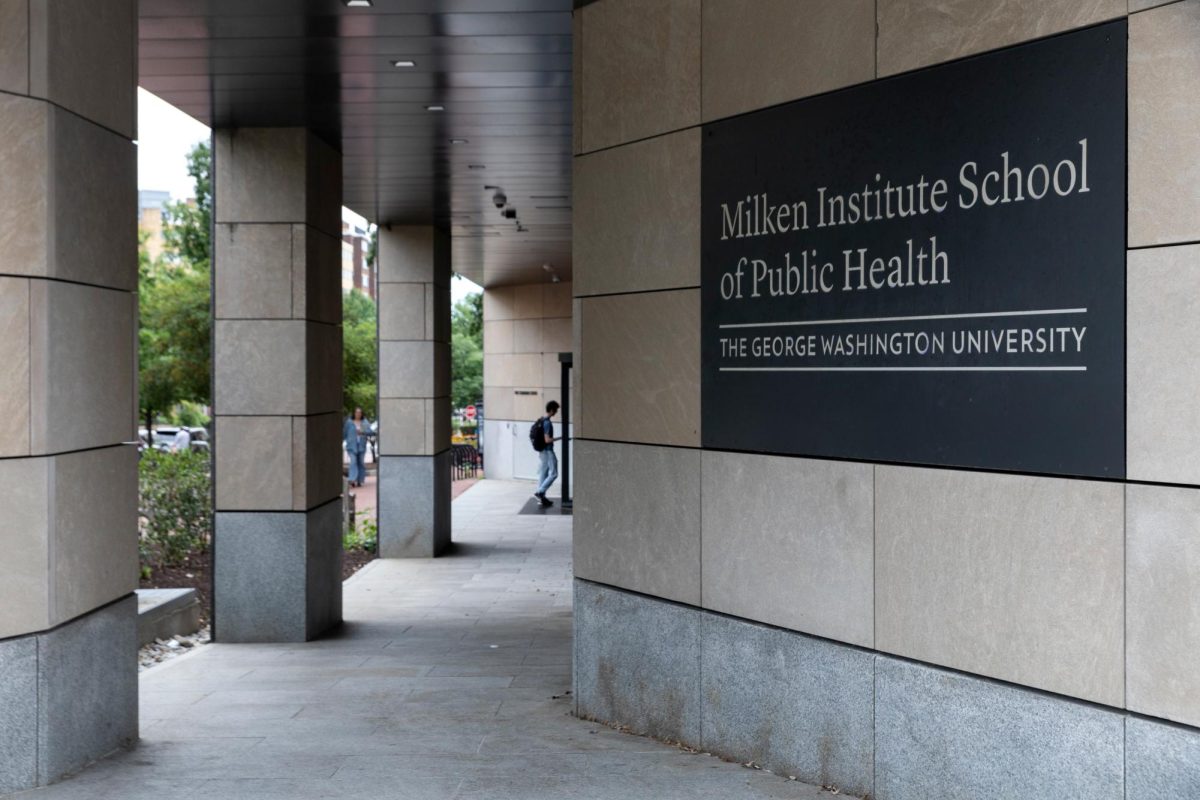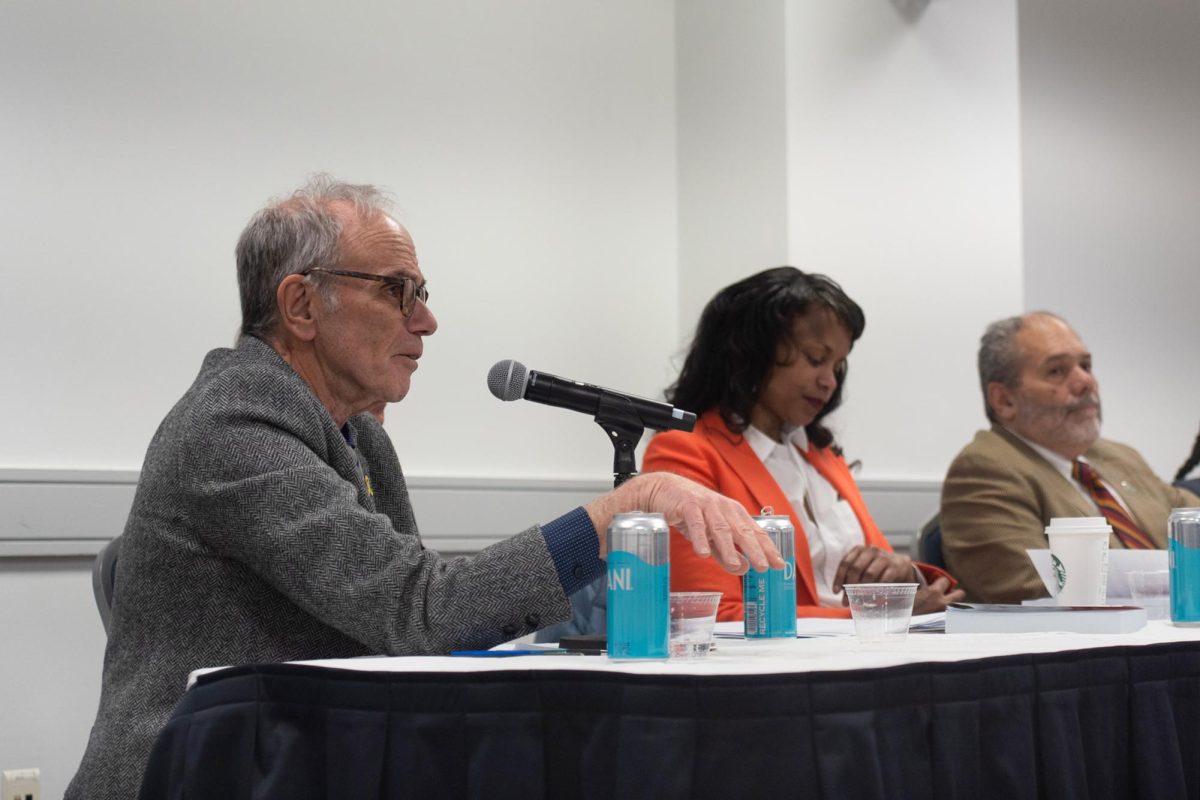Public health officials gathered at the Milken Institute School of Public Health on Monday for a two-part panel discussion on combating misinformation and rebuilding trust in medical institutions.
Experts in public health spoke about improving medical messaging and said public health officials and doctors need to connect and better relationships with communities who are skeptical of public health outreach due to years of poor communication from health officials. The talk kicked off the American Public Health Association’s programming for National Public Health Week, which started in 1995 with the goal of recognizing those who contribute to public health and highlighting crucial issues in the field.
Milken Dean Lynn Goldman gave opening remarks in which she said public health is not only a discipline but a movement driven by the idea that every person deserves the opportunity to lead a healthy life.
“Over the past few years the field of public health has been tested in ways few of us could have imagined, but we have also witnessed innovation, courage and community in action,” Goldman said in her opening remarks.
Julia Daisy Fraustino, a strategic communications professor at West Virginia University, Joel Bervell, a social media medical influencer, and Georges Benjamin, the executive director of the APHA, led the first panel — which discussed fighting health misinformation and the need to build trust in a community in order to provide effective health care.
Bervell said the medical community has to acknowledge when it loses trust due to historic instances of medical wrongdoing. He pointed to the 1932 to 1972 Tuskegee syphilis experiment — where doctors intentionally withheld treatment from Black male patients to study the effects of untreated syphilis — as an example of how unethical and racist studies on minority groups can lead to lingering feelings of skepticism toward modern medicine, which reduces its effectiveness in treating these groups.
“If a community doesn’t trust you, you can’t go into that community, understand their needs on the ground and then use that to best make informed decisions,” Bervell said.
Benjamin said government health officials, as opposed to doctors, struggled to effectively communicate the need to take precautions during COVID-19 because they appeared as “faceless bureaucrats” and lacked the personal relationship a doctor has with patients.
“We told people they had to wear a mask, and they had to take this shot, and they had to stay home, and we totally disrupted their lives,” he said. “And the truth of the matter is we had not built that trusted relationship.”
Benjamin said building trusted relationships with community members helped him in the 1980s when he went into communities affected by the HIV and AIDS epidemic to assess their needs.
“It wasn’t until we in public health got into those communities, talked to people that were impacted by HIV/AIDS, show them that we care, show them that they could trust us,” he said.
Veena Thamilselvan, the former chair of the APHA Student Assembly, Brian Castrucci, president and CEO of the de Beaumont Foundation, and Milken Professor Sara Rosenbaum led the second panel discussing how health professionals can adjust to new challenges like declining trust.
Castrucci said public health officials have to make an effort to reach out to Republicans, a group more likely than Democrats to distrust scientists. Sixty-six percent of Republicans say scientists act in America’s best interests, compared to 88 percent of Democrats.
“We all talk about DEI, that I, that inclusivity. Raise your hand if you’ve had a conversation with a conservative MAGA Republican lately,” he said. “Couple of us, are we being inclusive if we’re not reaching out to that sector?”
Castrucci said today’s “egalitarian” online media environment means those spreading misinformation can instantly reach wider audiences. A 2024 study at the University of Chicago that analyzed over 200 videos with a total of 300 million views on sinusitis found that of the roughly 100 videos posted by nonmedical influencers, only 47 percent were factually accurate.
“There’s always been snake oil salesmen, they just couldn’t reach a million people with a click of the mouse,” Castrucci said. “Now they can.”
Thamilselvan said she works with high school students on how to spot misinformation and cultivate “empathetic” communication techniques among themselves.
“The folks who you should be getting trusted information from, the people who you look to are the folks in your community who you’ve known,” Thamilselvan said. “And by teaching these high school students, I’m hoping that they become the next generation of trusted community leaders.”
Rosenbaum said the country is just “beginning to grapple” with how social media has altered the ability of people to agree with each other. She noted two bipartisan achievements under Republican presidents: The Emergency Treatment and Labor Act signed by Ronald Reagan, which she said is possibly the “most important” civil rights health care act, and the Environmental Protection Agency’s creation under Richard Nixon.
Rosenbaum said finding bipartisanship today is harder than it was during past administrations.
“That’s why I consider, in my case, the examples I gave, two of the great examples of coming together for the society, and we came together in public policy,” she said. “And the question is, can we get ourselves back to a time when we can come together in public policy.”










